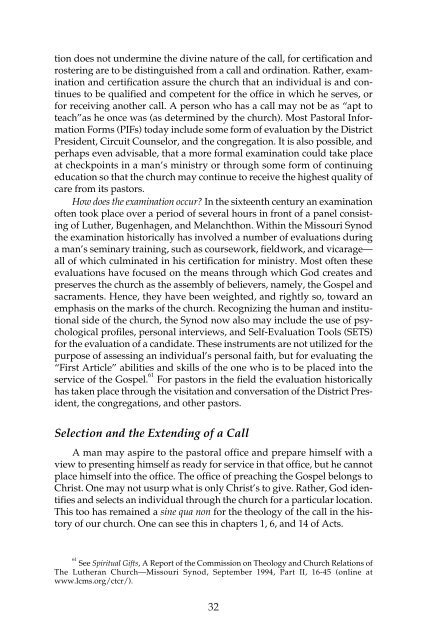45930 Divine Call CTCR final - The Lutheran Church—Missouri Synod
45930 Divine Call CTCR final - The Lutheran Church—Missouri Synod
45930 Divine Call CTCR final - The Lutheran Church—Missouri Synod
You also want an ePaper? Increase the reach of your titles
YUMPU automatically turns print PDFs into web optimized ePapers that Google loves.
tion does not undermine the divine nature of the call, for certification and<br />
rostering are to be distinguished from a call and ordination. Rather, examination<br />
and certification assure the church that an individual is and continues<br />
to be qualified and competent for the office in which he serves, or<br />
for receiving another call. A person who has a call may not be as “apt to<br />
teach”as he once was (as determined by the church). Most Pastoral Information<br />
Forms (PIFs) today include some form of evaluation by the District<br />
President, Circuit Counselor, and the congregation. It is also possible, and<br />
perhaps even advisable, that a more formal examination could take place<br />
at checkpoints in a man’s ministry or through some form of continuing<br />
education so that the church may continue to receive the highest quality of<br />
care from its pastors.<br />
How does the examination occur? In the sixteenth century an examination<br />
often took place over a period of several hours in front of a panel consisting<br />
of Luther, Bugenhagen, and Melanchthon. Within the Missouri <strong>Synod</strong><br />
the examination historically has involved a number of evaluations during<br />
a man’s seminary training, such as coursework, fieldwork, and vicarage—<br />
all of which culminated in his certification for ministry. Most often these<br />
evaluations have focused on the means through which God creates and<br />
preserves the church as the assembly of believers, namely, the Gospel and<br />
sacraments. Hence, they have been weighted, and rightly so, toward an<br />
emphasis on the marks of the church. Recognizing the human and institutional<br />
side of the church, the <strong>Synod</strong> now also may include the use of psychological<br />
profiles, personal interviews, and Self-Evaluation Tools (SETS)<br />
for the evaluation of a candidate. <strong>The</strong>se instruments are not utilized for the<br />
purpose of assessing an individual’s personal faith, but for evaluating the<br />
“First Article” abilities and skills of the one who is to be placed into the<br />
service of the Gospel. 61 For pastors in the field the evaluation historically<br />
has taken place through the visitation and conversation of the District President,<br />
the congregations, and other pastors.<br />
Selection and the Extending of a <strong>Call</strong><br />
A man may aspire to the pastoral office and prepare himself with a<br />
view to presenting himself as ready for service in that office, but he cannot<br />
place himself into the office. <strong>The</strong> office of preaching the Gospel belongs to<br />
Christ. One may not usurp what is only Christ’s to give. Rather, God identifies<br />
and selects an individual through the church for a particular location.<br />
This too has remained a sine qua non for the theology of the call in the history<br />
of our church. One can see this in chapters 1, 6, and 14 of Acts.<br />
61<br />
See Spiritual Gifts, A Report of the Commission on <strong>The</strong>ology and Church Relations of<br />
<strong>The</strong> <strong>Lutheran</strong> <strong>Church—Missouri</strong> <strong>Synod</strong>, September 1994, Part II, 16-45 (online at<br />
www.lcms.org/ctcr/).<br />
32


